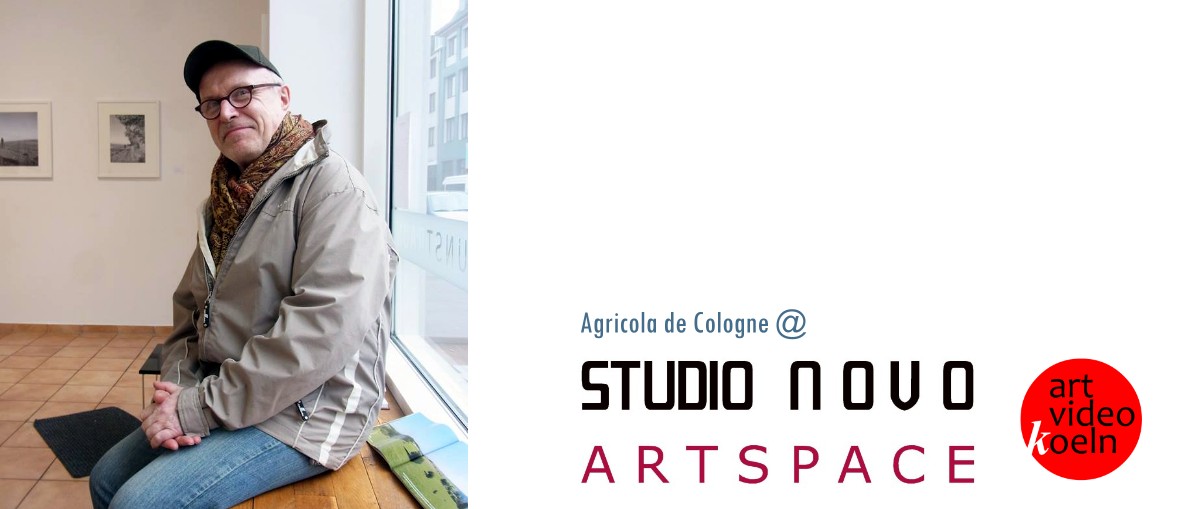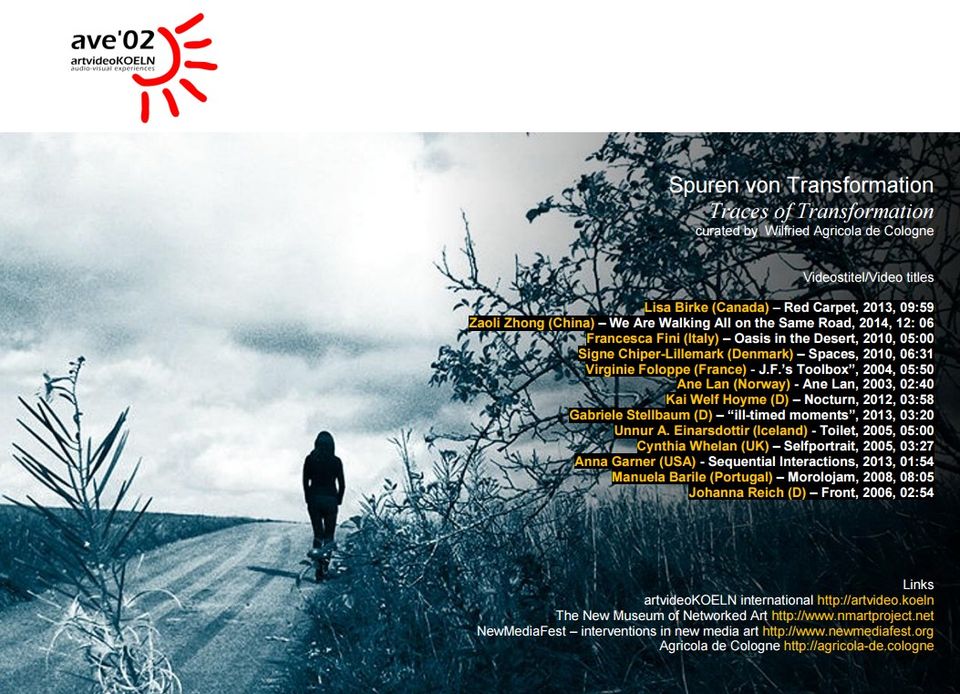artvideoKOELN Is happy to announce an audio-visual event series, entitled:

artvideoKOELN – audio-visual experiences 02
to take place 2016 in Cologne in collaboration with “novo artspace”.
An introducing event, is taking place on 1 April 2016, 19h under the motto: “Traces of Transformation”
@ novo artspace – in the context of the finissage of the current exhibition.
The series will start later on to be announced in detail yet.
The event format – artvideoKOELN – audio-visual experiences –
premiered in 2015 @ TENRI _ German-Japanese Cultural Centre – http://ave.artvideo.koeln/
is rooted on an outstanding collection of artfilms dealing with the topics “memory & identity”

.
novo artspace
https://studionovoblog.wordpress.com/
Sülzburgsstrasse 189
50937 Cologne
The – screening program – “Traces of Transformation” will be shown in the framework of the closure (finissage) of the current photo exhibition – “Women in Landscape” (Frauen in Landschaft) complementing its usual static character with the audio-visual aspects of moving images. The screening is representing at the same time the starting point of a series of audio-visual art events to be followed, entitled – AVE’02 – artvideoKOELN – audio-visual experiences 2.
List of Videos
Lisa Birke (Canada) – Red Carpet, 2013, 9:59
Zaoli Zhong (China) – We Are Walking All on the Same Road, 2014, 12: 06
Francesca Fini (Italy) – Oasis in the Desert, 2010, 5:00
Signe Chiper-Lillemark (Denmark) – Spaces, 2010, 6:31
Virginie Foloppe (France) – J.F.’s Toolbox”, 2004, 5:50
Ane Lan (Norway) – Ane Lan, 2003, 2:40
Kai Welf Hoyme (D) – Nocturn, 2012, 3:58
Gabriele Stellbaum (D) – “ill-timed moments”, 2013, 3:20
Unnur A. Einarsdottir (Iceland) – Toilet (2005), 5:00
Cynthia Whelan (UK) – Selfportrait, 3:27, 2005
Anna Garner (USA) – Sequential Interactions, 2013, 1:54
Manuela Barile (Portugal) – Morolojam 2008, 8:05
Johanna Reich (Germany) – Front, 2006, 2:54
 PDF catalogue available for download
PDF catalogue available for download
Curatorial statement
by Agricola de Cologne
It is the curatorial concept to implant a variety of different thematic aspects into the confrontation between the static and moving images.
While the photo exhibition is showing works by just one single artist (the Cologne based Robert Mohren) and his (male) point of view manifested in the distance of the represented female to him – the viewer is confronted with the backside of a woman, who obviously turned away from the spectator opening heart and mind instead to him/her towards the open landscape – unspoken and unspecified desires- without a recognizable target – hiding her individual identity. Thus the photo works do not portrait one or more individual females. The same is good for what the artist is calling “landscape”. He is not “portraying” specific sceneries or individual forms of nature. “The female” and “the landscape” become symbols, the photo image a philosophical message.
While the exhibition is presenting a number of individual photo works, the videos, depending on their duration, consist of a much larger quantity of images (frames), which – differently than other linear film formats like short or feature films – get each one an individual relevance, requiring a different kind of sensual perception.
The selection of “Traces of Transformation” is taking a counter position in many ways. On one hand, the videos – besides the one by Kai-Welf Hoyme – were created by female artists havíng each one a different cultural background and coming from different countries propagating therefore generally a female point of view (to be projected into the female protagonist of the photos, also the video by the only male video maker is no exception) – and may be identified with the different positions and perceptions of the female protagonist of the photos.
While the photos were choosing the “impersonal” space of the open landscape without any obvious target and desires the photo artist is projecting into both, the videos – directed to the spectator, reflect an intimate and very personal space projecting this intimacy and completely different desires into the female protagonist of the photo works – giving her the individual identity and history only (back) in each single photo work.
This difference (for instance, also in terms of gender behavior) is underlined by the different artistic media – while the photos are static forcing the spectator to project the process of his own interpretations into the image, by confronting the static works with moving images, the static images change their actual status, because now movement manifested via series of significant individual images was entering the static image – processes which allow the spectator to interpret completely differently through a progressively changing point of view.
Juxtaposed with each other the photo images and the “movies” start communicating, and by doing so they include the audience and the present artist, as well. Associations, perceptions and desires split into pieces leave traces of mutual transformations. The spectator gets actively involved in the process of transformation. The videos, as such and juxtaposed to each other – thus separated from the exhibition context – generate another different traces of transformation, as well as the individual video does – separated from the curatorial selection.
As complex artistic performative statements the videos cause the female protagonist (of the photo works) actually to leave the status of the original artistic concept and turn around to the spectator in order to communicate with him. During the process of communicating the perception of the spectator is changing while the photographic image factually remains unchanged, of course.
In the context of the “finissage”, both, static and moving medium, complement each other generating a new kind of experience through interacting.
announcement and invitation! – 1 April 2016, 19hScreening – "artvideoKOELN _ audio-visual experiences'02"@ Studio…
Posted by Wilfried Agricola De Cologne on Dienstag, 22. März 2016

